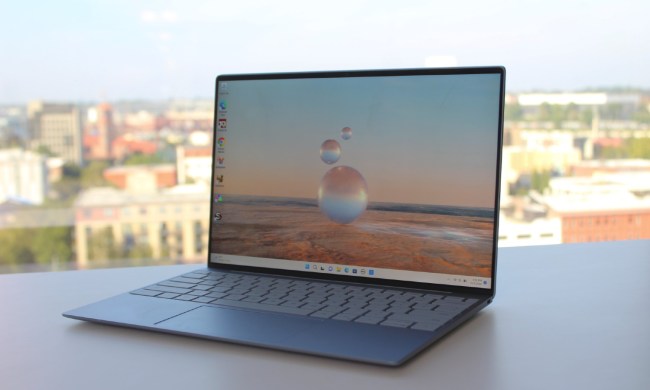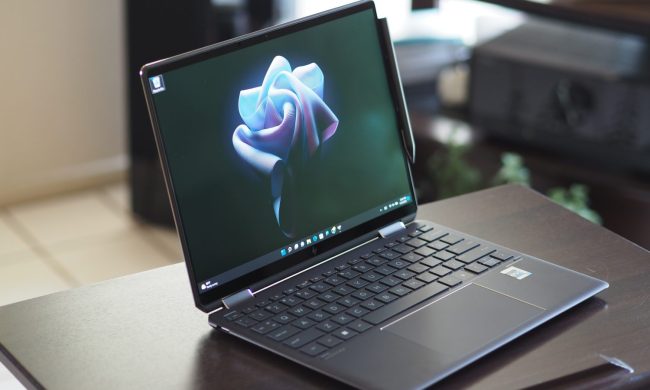They’re almost the same size. They weigh almost the same. They’re both 360-degree convertible 2-in-1s with support for active pens. So, why are HP’s Envy x360 13 and Spectre x360 13 so similar? It’s what’s inside that counts here, and there are enough differences that these two similar machines are aimed at different users. Neither shows up on our best laptops or best 2-in-1s lists, but that doesn’t mean they’re not excellent machines.
The Envy x360 13 is made for creators, people who do CPU-intensive tasks like video editing, while the Spectre x360 13 is made for discerning productivity users who want a bit of style. But is one of these laptops better than the other?
Specs
| HP Envy x360 13 | HP Spectre x360 13 | |
| Dimensions | 12.07 inches x 7.66 inches x 0.65 inches | 12.08 inches x 7.66 inches x 0.67 inches |
| Weight | 2.92 pounds | 2.8 pounds |
| Processor | AMD Ryzen 3 4300U AMD Ryzen 5 4500U AMD Ryzen 7 4700U Intel Core i5-1135G7 Intel Core i7-1165G7 |
Intel Core i5-1135G7 Intel Core i7-1165G7 |
| Graphics | Radeon graphics Intel Iris Xe |
Intel Iris Xe |
| RAM | 8GB or 16GB | 8GB or 16GB |
| Display | 13.3-inch Full HD (1,920 x 1,080) IPS 13.3-inch Full HD IPS with privacy panel |
13.3-inch Full HD with privacy panel 13.3-inch UHD (3,840 x 2,160) OLED |
| Storage | Up to 1TB solid-state drive (SSD) | Up to 2TB SSD |
| Touch | Yes | Yes |
| Ports | 1 x USB-C (with Thunderbolt 4 on Intel models) 1 x USB-A microSD card reader 3.5mm audio jack |
2 x USB-C with Thunderbolt 4 1 x USB-A microSD card reader 3.5mm audio jack |
| Wireless | Wi-Fi 6 and Bluetooth 5 | Wi-Fi 6 and Bluetooth 5 |
| Webcam | 720p | 720p with infrared camera |
| Operating system | Windows 10 Home or Pro | Windows 10 Home or Pro |
| Battery | 51 watt-hours | 60 watt-hours |
| Price | $690+ | $1,110+ |
| Rating | 4 out of 5 stars | 5 out of 5 stars |
Design
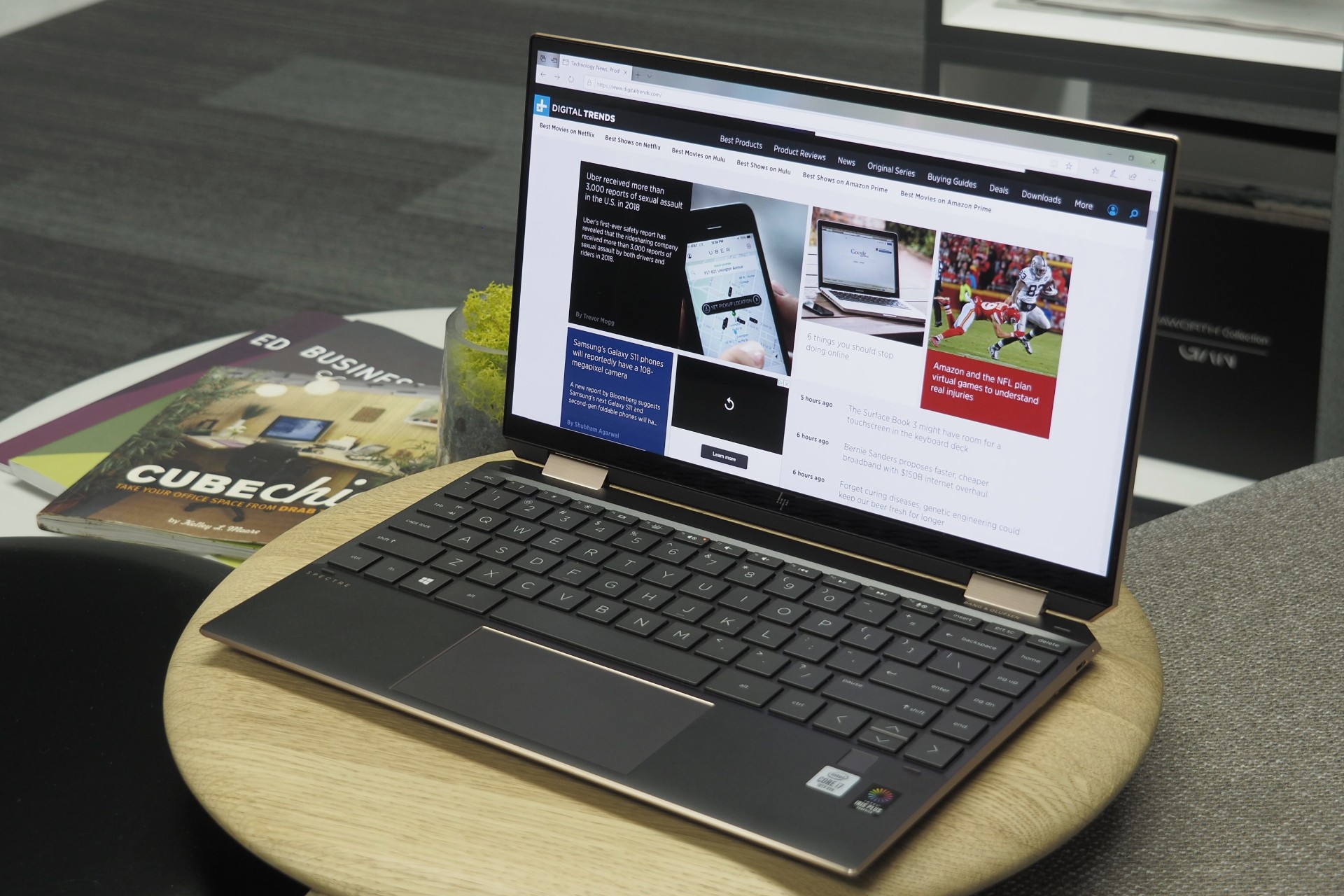
The Spectre x360 13 is an exquisitely crafted laptop with gem-cut corners and chamfered edges in colors that complement the chassis, which comes in Natural Silver, Nightfall Black, or Poseidon Blue. The Spectre is for people who want their laptop to express a sense of style. The Envy x360 13, on the other hand, has a minimalist design with simpler, cleaner lines and a more conservative aesthetic. It’s available in Pale Gold and Natural Silver in the Intel version, and Ceramic White and Nightfall Black in the Ryzen version. It, too, is an attractive laptop, but it’s not meant to attract so much attention.
Both laptops offer excellent build quality. The Spectre x360 13 is made from machined aluminum and so is solid as a rock, with among the best build quality you’ll find in a 2-in-1. The Envy x360 13 is made from stamped aluminum, and it too is solid — albeit perhaps just a bit less so than the Spectre. Both rank up there with the best 2-in-1s if rigid construction is important to you.
We’ve already said that these two laptops are almost identical in size and weight. The Spectre x360 is 12.08 inches wide by 7.66 inches deep by 0.67 inches thick, and it weighs 2.8 pounds. The Envy x360 13 is 12.07 inches by 7.66 inches by 0.68 inches and weighs 2.92 pounds. That’s close enough to be extremely difficult to tell apart by their dimensions alone. Interestingly, the Spectre x360 13 has smaller display bezels and a 90% screen-to-body ratio, compared to the Envy x360 13’s slightly larger bezels and an 88% screen-to-body ratio. Somehow HP managed to fit the difference into the same size chassis, meaning you’ll find similarly sized keyboard decks and palm rests as well.
Both the Envy x360 13 and Spectre x360 13 enjoy HP’s excellent keyboard that was once reserved for the Spectre line. It offers deep travel, a light touch with a precise and clicky bottoming action, and a consistent feel across the keys. It’s quiet, has great key spacing and comfortable keycaps, and has a handy row of positional keys along the right side. It’s one of the best keyboards you’ll find on Windows 10 laptops.
The touchpads are also similar wide versions that take up most of the available space on the keyboard deck. They offer similar smooth surfaces and support for Microsoft’s Precision Touchpad drivers, giving them precise and reliable support for Windows 10’s full complement of multitouch gestures. Both 2-in-1s have touch displays and support HP’s active pen. It’s a $70 option on both machines.
Besides the aesthetics, connectivity is another slight difference. The Spectre x360 13 offers two USB-C ports with Thunderbolt 4 on the refreshed models (we reviewed the late 2019 version, and only the internals changed), a USB-A port, a microSD card reader, and a 3.5mm audio jack. The Envy x360 13 has a single USB-C 3.2 port (no Thunderbolt on the AMD chipset models, Thunderbolt 4 on the Intel models), one USB-A port, a microSD card reader, and a 3.5mm audio jack. The Envy also uses a proprietary power adapter while the Spectre charges via USB-C. Both machines offer Wi-Fi 6 and Bluetooth 5 wireless connectivity.
Performance
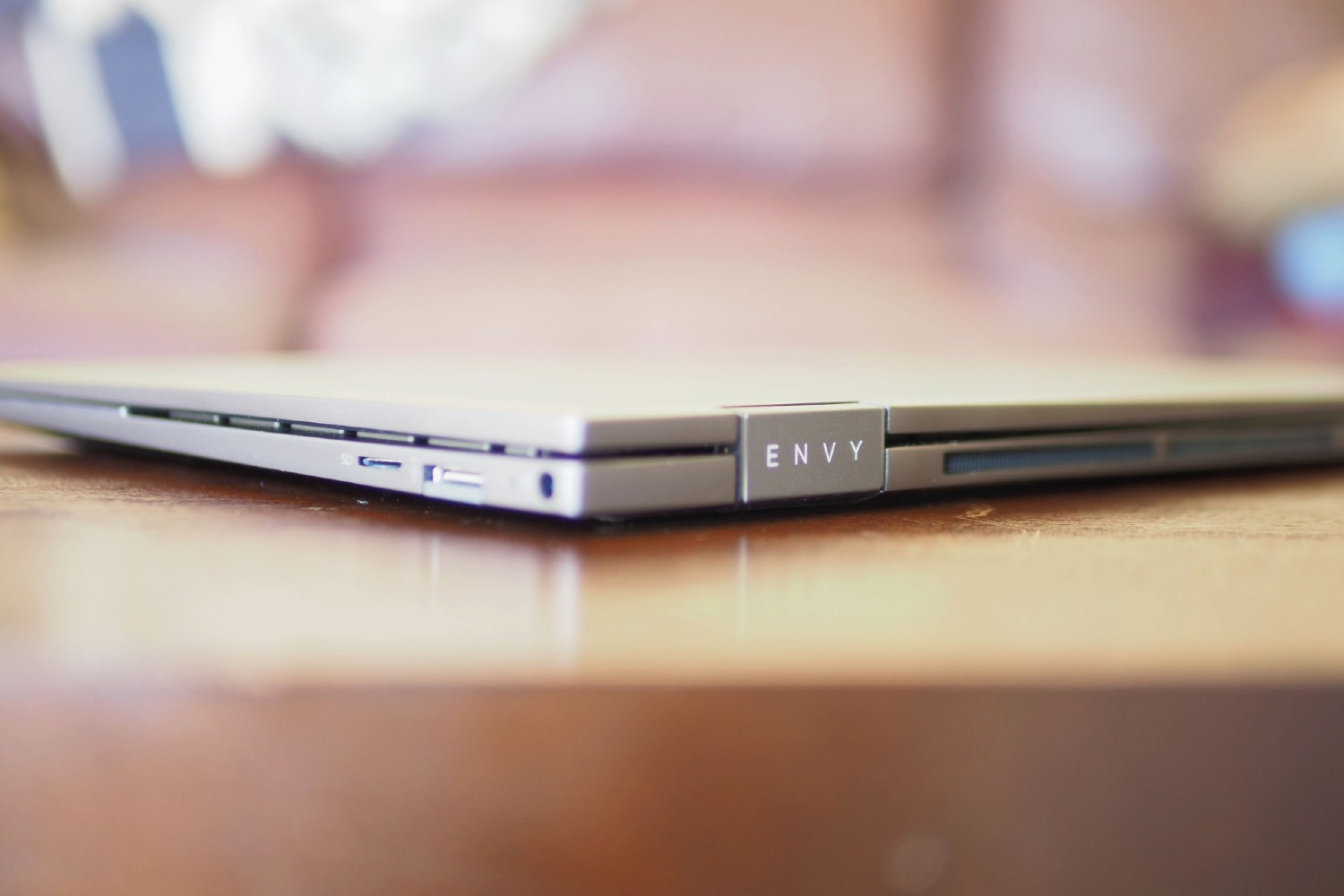
The Spectre x360 13 uses Intel’s 11th-generation Core processors, either the Core i5-1135G7 or the Core i7-1165G7, with up to 16GB of RAM and up to 2TB of solid-state drive storage. The Envy x360 13 comes in two versions, one running AMD Ryzen chips ranging from the Ryzen 3 4300U up to the Ryzen 7 4700U, offering up to 16GB of RAM, which can be configured with up to 1TB of SSD storage. The other version uses the Intel Core i5-1135G7 or Core i7-1165G7 CPU, up to 16GB of RAM, and up to a 1TB SSD.
We tested the older model of the Spectre x360 13 with a 1oth-gen Intel Core i7 and the Envy x360 13 with the Ryzen 5 4500U. The Envy was clearly the faster machine, and that would remain true even compared to the 11th-gen processors in the refreshed Spectre x360 13. In our Handbrake test, for example, which encodes a 420MB video to H.265, the Envy x360 13 was 27% faster than the Spectre x360 13 even in the latter’s performance mode. Both laptops offer HP’s Command Center utility to switch among various power settings, including a standard mode that balances CPU speed against heat and noise and a performance mode that runs hot, loud, and fast. The utility made the bigger difference with the Spectre x360 13, and in standard mode, the Envy x360 13 was twice as fast.
This performance delta extended to all our tests except gaming. The Envy x360 13’s Radeon graphics weren’t any faster than the Intel Iris Plus graphics in the Spectre x360 13, and the newer Iris Xe graphics in the Intel versions of both laptops would be faster. That will change once HP updates the Envy with the latest Ryzen 5000 series CPUs, but until then, the Envy is the lesser gaming machine. That’s not really saying much, though, since these laptops are only good for older titles and modern titles with resolution and graphics turned way down.
The Envy x360 13 Ryzen models are faster and better suited for creators — the market at which HP aimed the laptop. The Spectre x360 13 is no slouch when it comes to productivity, but it’s not going to keep up in CPU-intensive tasks.
Display
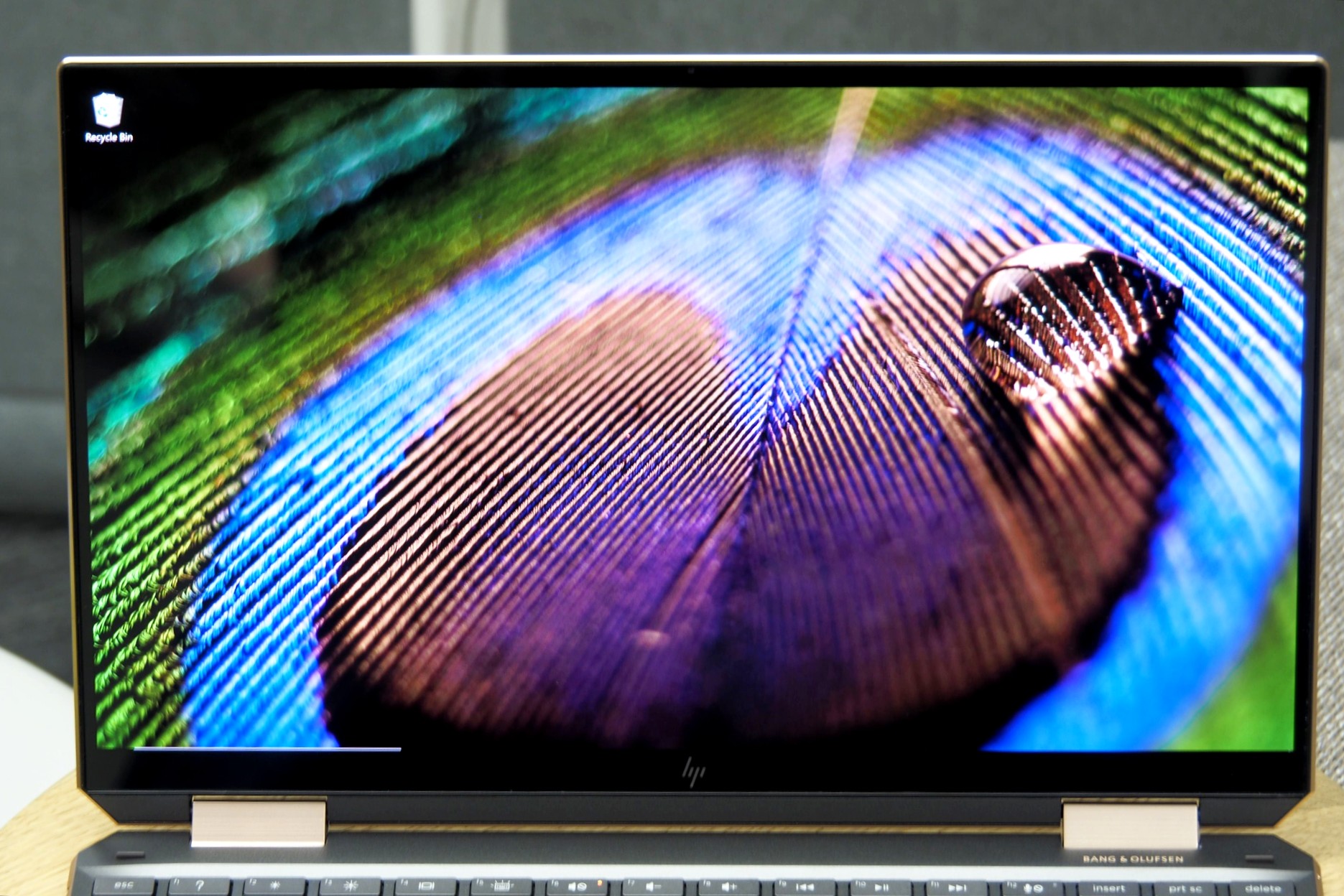
The Spectre x360 13 was the first 13-inch laptop to receive an OLED display, and it’s a 4K beauty. It offers wide colors (98% of AdobeRGB and 100% of sRGB) with excellent accuracy (DeltaE of 1.29), 405 nits of brightness, and OLED’s unparalleled contrast (405,210:1). There’s also a low-power IPS Full HD display available.
The Envy x360 13 Ryzen has a choice between an IPS Full HD display and a Full HD with a privacy screen. The Intel version swaps out the privacy screen option for an OLED panel. We tested the Full HD display, and it provided average colors (71% of AdobeRGB and 96% of sRGB), average accuracy at 2.26, high brightness at 399 nits, and good contrast for an IPS display at 1,110:1.
While the Envy x360 13 offers a good display, the Spectre x360 13’s OLED panel is superb. There’s really no comparison here.
Portability
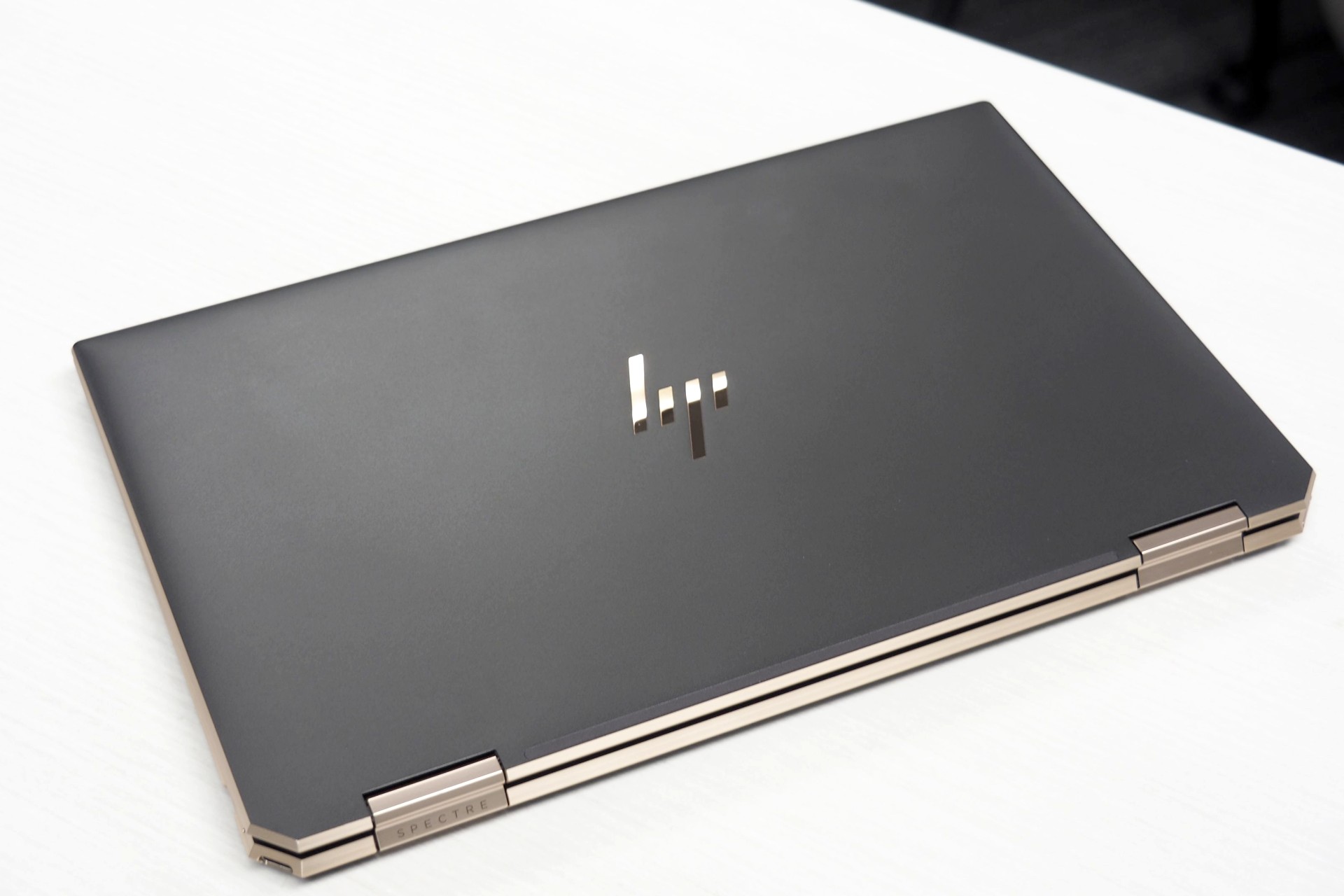
We’ve already established that these laptops are almost the same size, and they’re both highly portable laptops. You’ll barely notice them in your backpack.
Battery life is difficult to judge by our review results. The Spectre x360 13 didn’t get very good battery life despite its 62 watt-hour battery due to the energy-sucking OLED display. It barely crossed 5.5 hours in our web browsing test, a low score, and couldn’t hit 10 hours in our video looping test. The Envy x360 13 did better at just over nine hours browsing the web and 13 hours looping video.
Note that you’ll get significantly better battery life than both of our review units if you opt for the low-power display available for the Spectre x360. And you’ll likely get slightly better battery life with the Intel version of the Envy x360 13. As tested, though, the Envy x360 13 wins the battery life battle.
The Spectre x360 13 is the more refined laptop with the best display
The Envy x360 13 Ryzen starts at $690 for a Ryzen 3, 8GB of RAM, a 128GB SSD, and the Full HD display. It maxes out at $1,390 for the Ryzen 7, 16GB of RAM, a 1TB SSD, and the Full HD privacy screen. The Intel version is $810 for a Core i5, 8GB of RAM, a 256GB SSD, and a Full HD display, and tops out at $1,240 for a Core i7, 16GB of RAM, a 1TB SSD, and an OLED display. It starts in near-budget territory and ends up as a premium machine.
The Spectre x360 13 entry level is $1,110 for a Core i5, 8GB of RAM, a 256GB SSD, and a low-power Full HD display. The high-end machine costs $1,700 for a Core i7, 16GB of RAM, a 2TB SSD, and an OLED display. It’s a premium laptop from top to bottom.
It’s a challenge picking between these two laptops. The Envy x360 13 is less expensive and offers better performance with the Ryzen CPU, but you can’t get that processor with an OLED display. It’s a good-looking laptop, but not nearly as exquisite as the Spectre x360 13. In the end, we have to give the nod to the Spectre as the more refined laptop that offers the best-looking and best-built 13-inch 2-in-1 money can buy.
